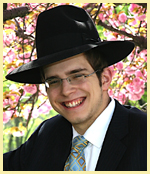Balancing Act
Parshas Yisro begins with the words Vayishma Yisro,’that Yisro HEARD.
All of the commentators delve in to what Yisro heard, and how what he heard motivated him to join Klal Yisrael, but less attention is given to the Torah’s emphasis on the sense of hearing specifically.
The beginning of next week’s Parsha discusses the laws of a Jewish slave sold for stealing. If a Jewish slave doesn’t want to leave his master after six years of ‘service,’ the Jewish Court will drill a hole in his ear because ‘the ear that heard by Har Sinai that we are not allowed to steal, and yet he stole, should be pierced….’
Again, why is it specifically the EAR that gets punished? The hands stole and the legs carried him to do the act of stealing, so why is the ear singled out?
The Medrash tells us that it is possible for a person to be completely sullied in sin with his entire body, but if his EARS haven’t sinned, there’s hope that he can do complete teshuva. Why again is the emphasis on the ears?
Perhaps we can understand the significance of the ear based upon the following: Our ears have two functions; they are the conduit for our hearing, and they give us our balance.
We are taught that every one of our senses has a spiritual side in addition to it’s more overt physical side. The ear represents the ability to be open to listening to words of rebuke, as well as the ability to ‘balance things’ objectively in order to figure out what is the correct path to take. When we sincerely calculate whether our actions are the correct ones, then we have the ability to grow and improve.
However, if a person rationalizes away everything he does with preconceived notions and is not open to hearing the truth, then there’s no hope for his doing teshuva. Hence, someone who steals after hearing clearly by Har Sinai to not steal must have his ear pierced to teach him that there is something inherently wrong with the function of his ears that is causing him to go astray.
Now we can understand Yisro as well.
Yisro had served every Avoda Zara in the world, but since he was open to HEARING and thus to finding the truth, he became the father-in-law of Moshe, with the Parsha of Kabalas Hatorah named after him.
Yisro is a prime example of the Medrash that as long as one’s EARS aren’t sullied in sin, there is always the capability of doing Teshuva.
May we all work on keeping our ears ‘spiritually healthy,’ i.e. to always be open to hearing the truth, and to always ‘balance’ everything we do before we do it, to make sure as best as we can that it is Ratzon Hashem.
To be added to the weekly Dvar Torah list please email zichronshaya@gmail.com



